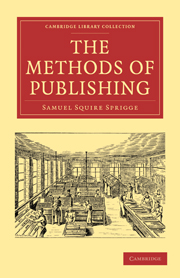Book contents
- Frontmatter
- Contents
- THE SOCIETY OF AUTHORS (INCORPORATED)
- PREFACE
- CHAPTER I LITERARY PROPERTY
- CHAPTER II THE VALUE OF ITS DIFFERENT FORMS
- CHAPTER III SALE, OUT-RIGHT AND LIMITED
- CHAPTER IV THE HALF-PROFIT SYSTEM
- CHAPTER V THE ROYALTY SYSTEM
- CHAPTER VI PUBLISHING ON COMMISSION
- CHAPTER VII ADVERTISEMENT
- CHAPTER VIII AUTHOR'S CORRECTIONS
- CHAPTER IX AGREEMENTS, MORE OR LESS
- CHAPTER X REMAINDER-SALES
- CHAPTER XI CONCLUDING REMARKS
- APPENDIX: THE SOCIETY OF AUTHORS. (INCORPORATED.)
- CONDITIONS OF MEMBERSHIP
APPENDIX: THE SOCIETY OF AUTHORS. (INCORPORATED.)
Published online by Cambridge University Press: 29 August 2010
- Frontmatter
- Contents
- THE SOCIETY OF AUTHORS (INCORPORATED)
- PREFACE
- CHAPTER I LITERARY PROPERTY
- CHAPTER II THE VALUE OF ITS DIFFERENT FORMS
- CHAPTER III SALE, OUT-RIGHT AND LIMITED
- CHAPTER IV THE HALF-PROFIT SYSTEM
- CHAPTER V THE ROYALTY SYSTEM
- CHAPTER VI PUBLISHING ON COMMISSION
- CHAPTER VII ADVERTISEMENT
- CHAPTER VIII AUTHOR'S CORRECTIONS
- CHAPTER IX AGREEMENTS, MORE OR LESS
- CHAPTER X REMAINDER-SALES
- CHAPTER XI CONCLUDING REMARKS
- APPENDIX: THE SOCIETY OF AUTHORS. (INCORPORATED.)
- CONDITIONS OF MEMBERSHIP
Summary
When this Society was first established, the founders were actuated by two leading principles. First, that literary property requires to be defined and protected by legislation, and the relations between author and publisher to be placed upon a basis of equity and justice. Second, that the question of copyright, especially between this country and America, is one which requires to be kept steadily in view and persistently attacked.
I. No one has ever denied that the relations of author to publisher are in the most unsatisfactory condition possible. There are no fixed principles; there has never been any attempt to decide on what principles of equity books should be published; there are twenty different methods of publication, not one of which has been ever advanced on the grounds of justice and fairness to author and publisher alike. Not only are there no fixed principles, but the trade of publishing is infested and brought into disrepute by persons who live by preying upon the ignorance and the inexperience of authors, plundering them in their agreements and cheating them in their returns.
It is clear that any steps taken with a view to regulate the trade according to principles of justice and equity should be greatly applauded by all honourable publishing firms, since they will cause the weeding-out of houses whose existence is a disgrace to the trade, and will conduce to the improvement of the legitimate book-market by staying the output of a mass of literature consisting for the most part of books which have no raison d être, whose production tends to divert the public from works of a more sterling character.
- Type
- Chapter
- Information
- The Methods of Publishing , pp. 113 - 116Publisher: Cambridge University PressPrint publication year: 2010First published in: 1890



